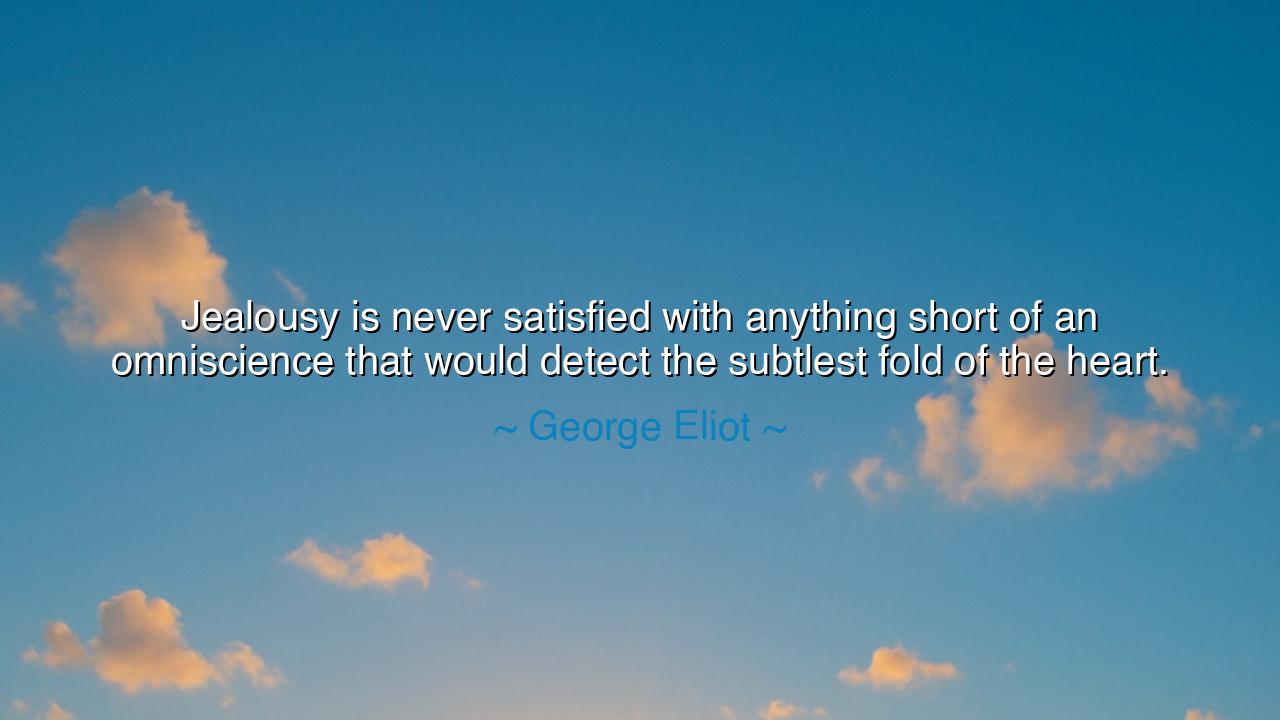
Jealousy is never satisfied with anything short of an omniscience
Jealousy is never satisfied with anything short of an omniscience that would detect the subtlest fold of the heart.






There are few emotions more consuming, more merciless, than jealousy—that storm of suspicion which darkens both heart and mind. The great novelist and moral philosopher George Eliot once wrote with piercing insight: “Jealousy is never satisfied with anything short of an omniscience that would detect the subtlest fold of the heart.” In this sentence lies a truth profound and tragic: that jealousy seeks not merely assurance or trust, but total knowledge—a godlike power to see into the very soul of another. Eliot, who understood human nature with the precision of a scholar and the compassion of a sage, spoke of jealousy as an inner tyranny—one that demands to know all, to unveil every hidden thought, until love itself suffocates beneath its scrutiny.
To understand Eliot’s meaning, we must first understand the origin of jealousy. It is born not in hatred, but in love’s shadow—where affection meets fear. The jealous heart trembles not because it loves too little, but because it cannot bear the unknown. It longs to pierce the veil of another’s soul, to discern whether love is pure, whether loyalty remains unbroken. Yet in seeking certainty, it destroys the very trust that sustains love. Eliot likens this hunger to omniscience, for jealousy is never content with simple answers—it demands to know everything. It yearns to uncover even “the subtlest fold of the heart”—every flicker of thought, every whisper of emotion that might threaten its dominion. But the tragedy is this: love cannot survive under the microscope of suspicion. What jealousy seeks to preserve, it inevitably destroys.
George Eliot, whose true name was Mary Ann Evans, lived in the 19th century and saw with deep clarity the struggles of the human soul. Her novels—Middlemarch, Daniel Deronda, The Mill on the Floss—are filled with characters whose virtues are tested by moral weakness. Through her art, she explored how emotions like envy and jealousy corrode the spirit. This particular quote echoes her belief that the desire for control is the death of trust. She saw that jealousy, by its very nature, denies freedom—it demands the right to know all, to see all, to govern all. It is the opposite of love, which requires surrender, faith, and humility before the mystery of another human soul.
History, too, offers grim confirmation of Eliot’s wisdom. Consider Othello, Shakespeare’s noble general, whose heart was devoured by jealousy. His love for Desdemona was vast, but his trust was fragile. When Iago whispered poison into his ear, Othello’s mind demanded the omniscience that Eliot describes—he sought to know every “fold” of his wife’s heart, to uncover thoughts that could not be known, to force truth from shadows. And in that demand for absolute certainty, he destroyed both her and himself. Jealousy made him divine in desire but monstrous in deed. So it is with all who surrender to suspicion: they mistake control for safety, and in their pursuit of knowledge, they lose both love and peace.
Jealousy, as Eliot teaches, is not satisfied by words or deeds. One may speak truth, swear loyalty, offer proof—and still, the jealous mind doubts. For jealousy feeds not on reality, but on imagination. It invents hidden meanings, secret glances, unspoken betrayals. It builds worlds of deceit out of the smallest gestures, until every silence becomes an accusation. That is why Eliot speaks of “the subtlest fold of the heart.” The jealous person would open that heart like a book and read every line, for they cannot rest until they know what cannot be known. Yet love, by its very essence, is built upon mystery. To love another is to accept that part of them will forever remain beyond our reach—and that is what gives love its sacredness and depth.
And so, the cure to jealousy is not knowledge, but trust. It is to surrender the craving for omniscience and to accept the limits of human understanding. The wise know that no heart can ever be fully known, and that the attempt to possess another’s soul is the surest path to losing one’s own. Love that endures is not built on surveillance, but on faith; not on perfect knowledge, but on mutual freedom. To love without trust is to chain what was meant to fly. Eliot’s words remind us that true intimacy requires reverence for the unknown within another—the quiet acceptance that the heart is its own kingdom, inviolate and sacred.
The lesson, then, is this: jealousy is a hunger for control, but love is an act of surrender. Beware the desire to know too much, for in seeking to read the folds of another’s heart, you may tear it open. Be content to love what you can see, and to honor what you cannot. When fear whispers, choose faith; when doubt rises, choose patience. Let love breathe in freedom, for trust is its oxygen. The jealous seek omniscience and find torment; the faithful accept mystery and find peace.
Thus, let George Eliot’s wisdom echo through the ages: the heart cannot be dissected without being destroyed. Love does not demand to know all; it learns to believe enough. Only by laying down the knife of jealousy can we hold another without wounding them—and only then does love, unshackled from fear, become eternal.






AAdministratorAdministrator
Welcome, honored guests. Please leave a comment, we will respond soon